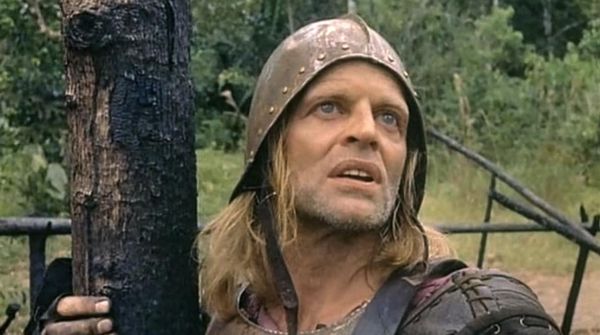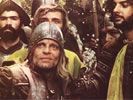Eye For Film >> Movies >> Aguirre: The Wrath Of God (1972) DVD Review
Aguirre: The Wrath Of God
Reviewed by: Gary Duncan
Read Gary Duncan's film review of Aguirre: The Wrath Of God
This is an excellent DVD package, thanks mainly to the funny and often shocking commentary from writer/director Werner Herzog.
Aguirre was his breakthrough film. It was also the first time he worked with Klaus Kinski. They went on to make a handful of films together but their relationship was volcanic and Herzog is brutally honest about it.

On the set, Kinski was a "pestilence every day", he says. "We liked each other, but we hated each other to such an extent that we both plotted independently to murder the other." There was a rumour that Herzog even pulled a gun on Kinski during the shoot, but Herzog tells us what really happened: "Actually I didn't pull a gun on him - but I did threaten to shoot him. I was unarmed and he said I pulled a gun on him in order to make himself look better. It wasn't like that, but I would have shot him. There was no doubt and the bastard understood it was not a joke."
Kinski gives as good as he gets, however. "I absolutely despise him," he says in the Talent Bio. "Huge red ants should piss into his lying eyes, gobble up his balls, penetrate his asshole and eat his guts."
Herzog says they first met when he was thirteen at boarding school. Kinski was "picked up from the street and immediately wrought havoc on everyone who lived there." Later, they shared a flat. "It was just stunning," Herzog recalls. "He would destroy everything and cause chaos."
During filming, Kinski got into an argument with some native Indian extras. They were having a party and he was trying to sleep. Kinski grabbed his Winchester rifle and fired three times into the extras's hut. No one was killed, Herzog says, but one of the extras emerged from the hut minus a finger.
Dealing with Kinski wasn't Herzog's only problem. Aguirre was a tough shoot, set entirely on location in the swamps of the Peruvian jungle during the rainy season, on a budget of just $360,000 with a skeleton crew. Along the way, Herzog had to man manage 450 native Indian extras suffering from altitude sickness, pawn his watch to keep the production afloat and rewrite the script when the Amazon flooded and washed away vital equipment. Herzog is nothing if not stoical, however, maybe because things could have been much, much worse - a couple of days before filming started, he and the crew were bundled off a flight at the last minute. The plane subsequently crashed, killing 94, with only one survivor.
Herzog wrote the screenplay in two and a half days, most of it during a football trip with friends. "We were on a bus and 200 miles into the trip everyone was drunk, because we had a lot of beer barrels with us as a present for our opponents. Our goalie, who was a very tall man, was leaning over me and was so drunk that he finally vomited over my typewriter. Some of the pages were beyond repair and I had to throw them out the window."
Herzog comes across as a very instinctive filmmaker. "We had no time to make it and no resources," he says, and this helps explain the film's raw, authentic feel. He dismisses storyboarding and says he would often improvise dialogue on the spot. He also uses non-actors in key roles - the girl who plays Kinski's daughter was a schoolgirl from Lima and the flute-player a retarded street beggar. Herzog spotted him, liked the way he played and wrote him into the film.
Despite the problems, the film was shot in just four weeks and edited in five. Many scenes - including the long opening shot of 450 Indians negotiating a steep mountain trail - were done in one take.
Most of the film was shot on a single 35mm camera, which Herzog casually admits he "expropriated" from a film school in Munich. "Actually it was stolen," he explains. "They never gave it out to aspiring young filmmakers so these cameras were sitting on a shelf and one day I found myself alone in this room and I just snatched one and walked out."
He made another eight films with the camera. "I didn't consider it theft - it was just a necessity. I had some kind of natural right for a camera, a tool to work with."
Reviewed on: 22 Mar 2004
















